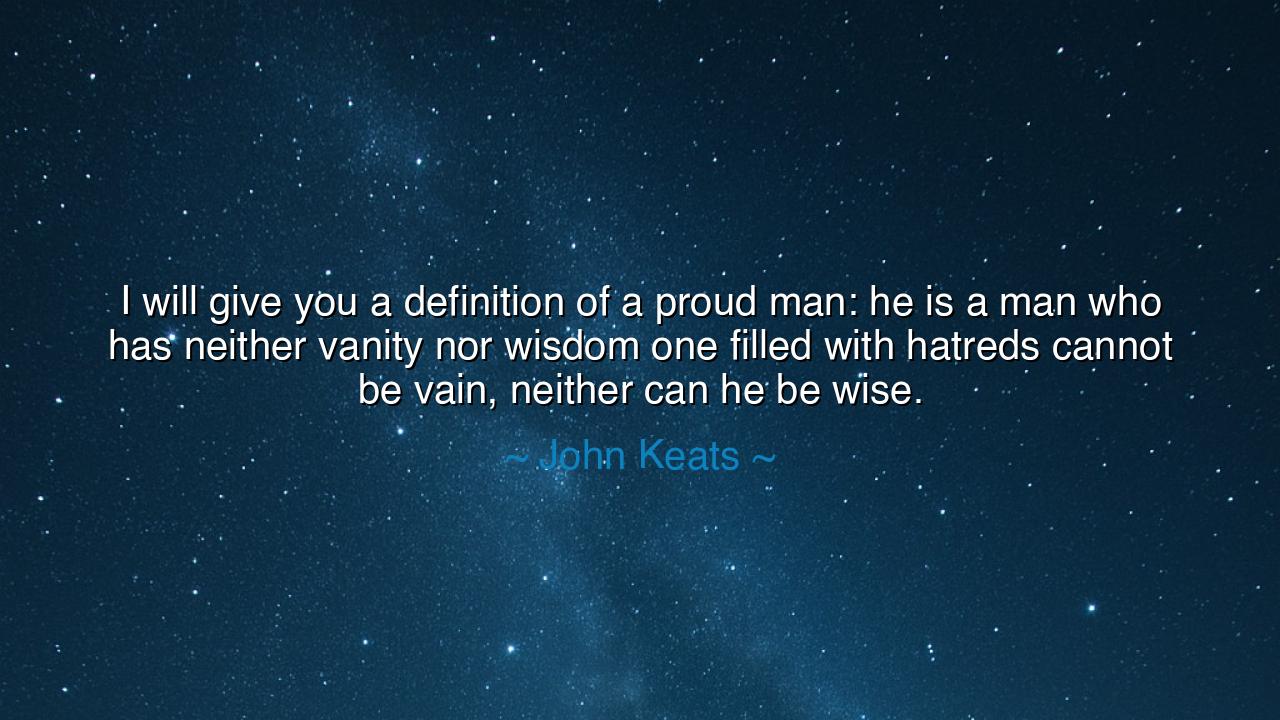
I will give you a definition of a proud man: he is a man who has
I will give you a definition of a proud man: he is a man who has neither vanity nor wisdom one filled with hatreds cannot be vain, neither can he be wise.






The poet of beauty and sorrow, John Keats, once declared: “I will give you a definition of a proud man: he is a man who has neither vanity nor wisdom; one filled with hatreds cannot be vain, neither can he be wise.” In these words, he tears away the veil of pride and shows it as a barren thing, stripped of both the shallow sparkle of vanity and the deep glow of wisdom. For hatred dries up the fountains of the heart, leaving only coldness where joy and reflection might have been.
The origin of this thought lies in Keats’s meditations on the human spirit. He knew well the difference between vanity, which seeks the approval of others, and wisdom, which seeks truth. Though both may be flawed in their way, they are still signs of a soul reaching outward—vanity toward recognition, wisdom toward understanding. But the truly proud man, Keats warns, is consumed by hatred, so that he reaches neither outward nor upward. He stands alone, hollow, incapable of either self-reflection or love.
History shows us such a man in Adolf Hitler. He was not vain, for he cared little for the beauty of self-presentation, nor was he wise, for his hatreds blinded him. His pride was of the darkest kind, rooted not in vanity’s harmless display but in the consuming fire of resentment. And because of this, he brought not light but ruin upon nations. He is the dreadful fulfillment of Keats’s words: where hatred rules, neither vanity nor wisdom can live.
The ancients too perceived this truth. The Greeks spoke of Achilles, whose wrath made him forget reason, honor, and mercy. Though vain at times, and though a man of great gifts, his pride in hatred nearly cost his people everything. By contrast, men like Pericles, though sometimes vain, balanced their flaws with vision and reason, leaving behind works of wisdom. The lesson endures: the proud man filled with hatred builds nothing but ashes.
Therefore, O seekers, remember this: better to be vain than consumed by hate, better to stumble in foolish pride than to harden the heart in bitterness. For vanity may yet lead to humility, and folly to reflection; but hatred destroys both, leaving a man stripped of his humanity. Guard your heart from rancor, lest you become that barren soul Keats describes—a proud man who is neither admired for vanity nor revered for wisdom, but pitied as one who could not love.






N7Kim Ngan 7.2
I feel intrigued by Keats’ unconventional framing of pride. It seems to suggest that pride detached from both vanity and wisdom is almost an empty or dangerous state. How does one cultivate self-respect without tipping into arrogance or losing the ability to learn? Could this perspective inform modern ethical or psychological discussions about ego, emotional health, and the pursuit of virtue? I’m also curious about the historical and literary context that shaped Keats’ view of character.
TNthinh nguyen
This statement prompts me to consider whether pride is inherently virtuous or flawed. If a proud man lacks vanity and wisdom, does that make pride a neutral or even negative trait? Could this interpretation explain why some people’s self-regard is destructive rather than inspiring? I also wonder how emotions like hatred or resentment distort character, and whether Keats is advocating for a balance between self-respect, knowledge, and emotional control as essential for true dignity.
GDGold D.dragon
Reading this, I’m struck by the notion that hatred prevents both vanity and wisdom. Does this mean that a person consumed by negativity is incapable of self-reflection or meaningful achievement? How does this definition of pride compare to more common ideas that equate pride with confidence or accomplishment? I’m curious whether Keats is describing a philosophical ideal, a moral observation, or a psychological truth about human character and its limitations.
HVNguyen Vu Ha Vi
This idea makes me reflect on the complex relationship between pride, wisdom, and emotion. Keats seems to suggest that a truly proud man is neither vain nor wise, which feels counterintuitive. Can pride exist without vanity, or is this a subtle critique of the destructive nature of hate and obsession? I also wonder whether this perspective implies that wisdom requires humility and emotional balance, and how that aligns with modern views on personal growth and character.